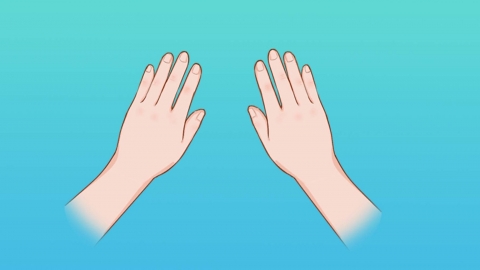What Causes Constant Cracking of the Hands?
Generally, persistently cracked hands may be caused by factors such as dry climate, frequent hand washing, tinea manuum (hand fungus), eczema, diabetes, and other reasons. It is recommended to seek timely medical consultation and follow the guidance of a physician for treatment. Detailed explanations are as follows:

1. Dry Climate
In autumn and winter seasons, the air tends to be dry and humidity levels drop, causing rapid moisture loss from the skin on the hands. This leads to decreased skin hydration, making the skin dry and rough, and prone to cracking. Daily care should focus on hand moisturizing; applying hand cream immediately after washing hands and wearing gloves during outdoor activities can help reduce moisture loss.
2. Frequent Hand Washing
Excessive use of alkaline cleaning products such as soap or hand wash can strip away the natural oil layer on the skin surface, increasing moisture loss and making the skin dry and fragile, which can eventually lead to cracking. Reduce the frequency of hand washing, avoid frequent use of strong alkaline cleansers, and apply hand cream after washing to protect the skin.
3. Tinea Manuum (Hand Fungus)
Hand fungus is primarily caused by infection with dermatophytes (fungi). These fungi thrive in warm and humid environments. When the skin on the hands comes into contact with these fungi, they invade the stratum corneum (outer skin layer), grow and metabolize within it, damaging the skin's normal structure and causing cracks. Symptoms may also include itching, blisters, and red patches on the hands. Antifungal medications such as miconazole nitrate cream, terbinafine hydrochloride cream, or clotrimazole cream can be applied topically under a doctor's guidance to relieve symptoms.
4. Eczema
Eczema may be related to contact allergens, genetic factors, or abnormal immune function. Eczema damages the skin's barrier function, increasing moisture loss and causing abnormal proliferation and differentiation of skin cells, leading to thickened, rough skin that eventually cracks. Symptoms may also include papules (small bumps) and exudation (weeping skin). Under a physician's recommendation, topical corticosteroids such as hydrocortisone butyrate cream or mometasone furoate cream, and antihistamines such as loratadine tablets or cetirizine hydrochloride tablets may be used for treatment.
5. Diabetes
Diabetes may result from genetic factors, irregular eating habits, and other causes. Poor long-term blood sugar control can lead to peripheral neuropathy and vascular complications. Peripheral nerve damage can reduce sensation in the hands, decreasing sensitivity to injuries, making the skin more susceptible to external irritants and damage, resulting in dry, fragile skin that cracks. Other symptoms may include frequent urination, weight loss, and slow wound healing. Follow medical advice to use medications such as metformin hydrochloride tablets, recombinant human insulin injection, or glipizide tablets to alleviate symptoms.
In daily life, maintain a balanced diet to ensure adequate nutrition, avoid contact with irritants such as dishwashing liquid and laundry detergent, and undergo regular physical examinations to detect and treat underlying conditions promptly.









